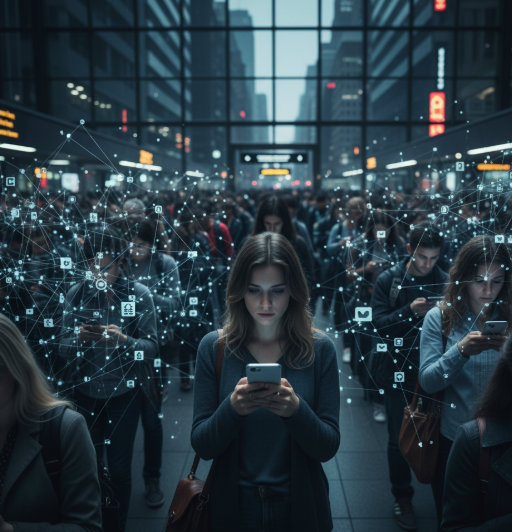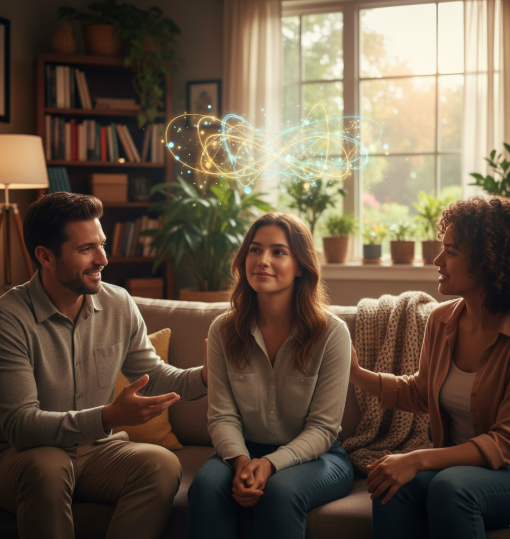The Loneliness Epidemic
🌿 The Loneliness Epidemic: Why Adult Friendships Feel So Hard (and How We Can Reconnect)
Let’s be real - loneliness has quietly become one of the biggest mental health challenges of our time. We scroll, we “like,” we join group chats and video calls… yet somehow, we still feel disconnected.
For young adults especially, that sense of belonging we once took for granted in school or college seems to vanish overnight. Those built-in communities - dorm life, study groups, shared activities - are replaced by work schedules, distance, and digital interactions. Suddenly, we realize that making friends as an adult feels... almost impossible.
And for many who didn’t attend traditional college or have moved frequently, it’s even harder. Society doesn’t exactly hand us a guide on how to build meaningful friendships from scratch.
Why Adult Friendships Are So Hard
In therapy, I hear versions of this all the time:
“I don’t know where to meet people anymore.”
“Everyone already has their group.”
“I’m surrounded by people, but I still feel lonely.”
You’re not imagining it. The world isn’t built for connection the way it used to be.
Once we leave those natural social structures - school, college, even our first jobs - we enter a phase of life that often centers around independence, productivity, and survival mode. Between work, commutes, family obligations, and mental load, most adults feel like there’s simply no time left for friendship.
And even when we want to connect, scheduling it can feel like one more task on an already full calendar. After a long week, rest wins - and understandably so. But over time, that “I’ll reach out soon” turns into months, and connection quietly slips down the priority list.
.
Loneliness Isn’t a Character Flaw - It’s a Signal
Here’s something I remind my clients often: loneliness isn’t proof that something’s wrong with you. It’s a biological cue that something’s missing.
Humans are wired for connection - it’s a survival mechanism. When our need for belonging isn’t met, our nervous system actually perceives that as danger. The ache of loneliness is your body saying, “I need people.”
But because our culture praises independence, we often shame ourselves for needing closeness. We tell ourselves to “be fine alone” instead of acknowledging that connection is essential to our mental and emotional health.
Need Support to Build Connections?
Rebuilding Connection: What Helps
The good news? We can rebuild connection - but it requires intentionality and compassion for the season you’re in.
🌿 Start small. Connection doesn’t have to be a big outing. Send a text, make a quick call, or invite someone to run errands together. Micro-social moments matter.
🌿 Revisit safe connections. Reach out to one person you already trust. Friendship doesn’t always mean “new.” Sometimes it’s reconnecting with people who already know your heart.
🌿 Join purpose-driven spaces. Look for hobby-based groups, volunteer work, or wellness communities. Shared meaning often leads to authentic friendship.
🌿 Make space for connection. Schedule it like you would a workout or therapy appointment - not because it’s a chore, but because it’s essential. Consistency matters more than quantity.
🌿 Be gentle with yourself. There’s no timeline for belonging. Friendships in adulthood grow slower, but often deeper.
Healing Through Connection
The loneliness epidemic isn’t just about social isolation - it’s about emotional hunger. We all want to be seen, understood, and valued.
Healing starts with connection - with others, and with ourselves. Sometimes that means joining therapy, sometimes it means finding community, and sometimes it’s as simple as saying “yes” to one new experience.
You’re not broken for craving closeness. It’s one of the most human things about you.
Connection doesn’t require perfection - just presence.
🌱 Final Thoughts: Reimagining Connection
If you’re feeling lonely, please know you’re not the only one. So many adults are craving the same thing - real, lasting connection that feels safe, mutual, and nourishing. The truth is, we outgrow certain environments, but that doesn’t mean we’re meant to outgrow community.
Connection doesn’t have to happen in loud, crowded spaces. It often begins in small, organic ways - the kinds that don’t require you to perform or pretend.
🌿 Start with shared energy. Visit local coffee shops, book clubs, or yoga studios where you can simply exist among others without pressure.
🌿 Volunteer for something that matters to you. Serving alongside others creates natural bonds rooted in shared purpose.
🌿 Try wellness or creative spaces. Mindfulness workshops, art circles, or holistic healing events attract others seeking the same kind of authentic growth you value.
🌿 Let connection happen slowly. Deep friendships build with time, presence, and repetition. Keep showing up - even when it feels awkward or uncertain.
You Deserve Connection
Loneliness doesn’t mean you’ve failed - it means you’re human. It means your heart still believes in closeness, in laughter that fills the quiet, and in relationships that remind you you’re not alone.
If you’ve been feeling isolated or disconnected, therapy can be a powerful space to start rebuilding that sense of belonging - both within yourself and with others.
✨ Ready to start reconnecting?
Schedule a consultation or reach out here. Together, we can explore what authentic, soul-nourishing connection could look like for you.






